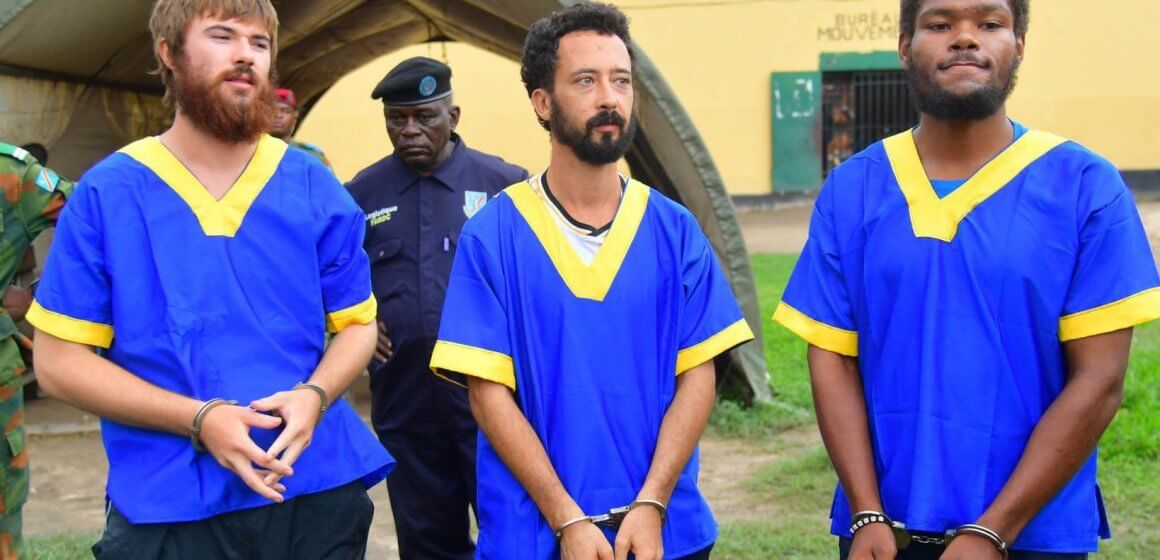|
LISTEN TO THIS THE AFRICANA VOICE ARTICLE NOW
Getting your Trinity Audio player ready...
|
Nearly a year after gunfire erupted in Kinshasa in what authorities described as an attempted coup, three Americans who were at the heart of the chaos were Tuesday, April 8, 2025, quietly flown back to the United States where they will continue to serve life sentences behind bars.
The men; Marcel Malanga Malu, Taylor Christa Thompson, and Zalman Polun Benjamin Reben, had been sentenced to death in January by a Congolese military court for their roles in the failed uprising. The verdict shocked observers in both Africa and the West. But in a swift reversal last week, the death penalties were commuted to life imprisonment, paving the way for their return home.
On Tuesday, the trio was escorted under tight security to Kinshasa’s N’Djili International Airport, where they were handed over to U.S. officials in a transfer that symbolized more than just legal cooperation. Behind the scenes, sources say, the move reflects an evolving, and increasingly strategic, relationship between the Democratic Republic of Congo (DRC) and the United States.
The story began in May 2024, when security forces clashed with armed men attempting to storm both the presidential palace and the residence of a senior government ally. The assault was linked to Christian Malanga, a Congolese-born American citizen with a history of political activism and a record of anti-government rhetoric. Malanga was killed during the operation; his 21-year-old son, Marcel, was captured alive.
By September, Congolese authorities had charged 37 individuals , including several foreigners, with terrorism, conspiracy, and armed rebellion. Trials were swift. Verdicts were harsh. Alongside the Americans were nationals from Belgium, Canada, and the UK, with all found guilty in a military courtroom that human rights groups criticized for lack of transparency.
Although U.S. officials voiced concern over due process, they did not dispute the severity of the crimes. “We support accountability and justice,” a State Department spokesperson said this week, adding that the three men were now “in our custody.”
DR Congo’s decision to return the Americans appears to have been part of a broader diplomatic recalibration. Over the past year, President Félix Tshisekedi’s administration has been actively re-engaging with Western powers, particularly the U.S., as it seeks to counterbalance the growing economic influence of China, whose companies currently dominate the country’s mining sector.
With the world shifting toward green energy, Congo’s mineral wealth has become a strategic asset. It is home to some of the planet’s largest reserves of cobalt and coltan, essential in manufacturing electric vehicles, smartphones, and renewable energy technology. As Western nations race to secure supply chains free of Chinese dominance, Congo has emerged as a key battleground.
Just days before the prisoner transfer, a senior adviser to U.S. President Donald Trump visited Kinshasa and hinted at major American investments in Congo’s mining sector, potentially worth billions. Analysts say the timing was no coincidence.
“This isn’t just about prisoners,” said one Kinshasa-based political analyst. “It’s about the United States signaling goodwill while positioning itself for a slice of Congo’s mineral future.”
Although the three Americans are now on U.S. soil, their legal troubles are far from over. Legal experts note that repatriation in such cases typically comes with strict conditions. The U.S. is unlikely to release or reduce their sentences, not least because of the diplomatic sensitivities involved.
The exact terms of the transfer have not been disclosed, but the U.S. State Department emphasized that any incarceration will continue to reflect the seriousness of the crimes. “There is no leniency in this,” one official noted.
Meanwhile, the fate of the other foreign nationals convicted in the coup plot remains uncertain. A Belgian-Congolese defendant was transferred to Belgium in February due to medical concerns. But it is unclear whether British, Belgian, or Canadian citizens still in DRC custody will receive similar sentence commutations or transfers.
The political fallout from the failed coup has not fully settled. Anti-government demonstrations, some of which led to attacks on foreign embassies earlier this year, further strained diplomatic ties. Reports suggest that the Congolese government agreed to cover damages to the U.S. embassy in Kinshasa, though American officials have not commented publicly.











LEAVE A COMMENT
You must be logged in to post a comment.